Hello, shepherd lovers today I will explain in detail How Long do German Shepherd Dogs Live.
German Shepherds are one of the most beloved dog breeds worldwide. Known for their intelligence, loyalty, and versatility, they often serve as loyal companions, working dogs, and even service animals. As prospective dog owners consider bringing a German Shepherd into their homes, it’s crucial to understand not only their endearing traits but also their lifespan.
Understanding the lifespan of German Shepherds is vital for prospective owners because it helps them make informed decisions about the commitment they’re making. Dogs, like humans, have finite lifespans, and caring for a pet involves responsibilities that span many years. By knowing the typical lifespan of German Shepherds and the factors that influence it, potential owners can better prepare for the journey ahead, ensuring they provide the best possible care for their furry friends throughout their lives.
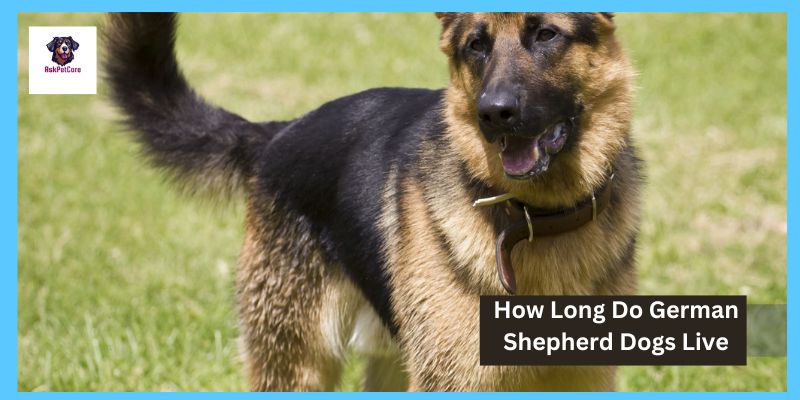
In this guide, we’ll delve into the average lifespan of German Shepherds, the factors that can affect their longevity, common health issues to watch out for, and practical tips for extending their lifespan. By the end, you’ll have a comprehensive understanding of what it takes to help your German Shepherd live a long, healthy, and fulfilling life by your side.
Hello everyone who loves dogs! I’m Dr. Arif Aziz, and I’ve been taking care of pets especially dogs at my clinic for a long time, exactly 14 years! I’m here to share some valuable information with you that I’ve gathered from books during my study time written by experts in veterinary medicine (DVM) and MSC (Master of Science), as well as from my own experiences working with dogs.
Average Lifespan of German Shepherds:
German Shepherds typically live between 9 to 13 years, although individual lifespans can vary. Several factors influence how long a German Shepherd lives, and understanding these factors can help owners ensure their pets live healthier and longer lives.
- Genetics: Like humans, genetics play a significant role in a German Shepherd’s lifespan. Some health conditions, such as hip dysplasia or degenerative myelopathy, can be hereditary. Responsible breeding practices and selecting a puppy from a reputable breeder who screens for genetic disorders can increase the likelihood of a longer lifespan.
- Health Care: Proper health care is crucial for extending a German Shepherd’s lifespan. Regular veterinary check-ups, vaccinations, and preventive care measures can help detect and address health issues early, preventing them from escalating into more severe problems. Additionally, maintaining a healthy weight through balanced nutrition and regular exercise can contribute to overall wellness and longevity.
- Environment: The environment in which a German Shepherd lives also impacts their lifespan. A safe and stimulating environment with access to clean water, nutritious food, shelter, and exercise opportunities promotes physical and mental well-being. Minimizing exposure to toxins, hazards, and extreme weather conditions can help prevent accidents and illnesses that may shorten their lifespan.
- Lifestyle Factors: Lifestyle factors, such as diet, exercise, and mental stimulation, play a significant role in a German Shepherd’s lifespan. Providing a balanced diet tailored to their nutritional needs, engaging in regular physical activity to maintain a healthy weight and strengthen muscles, and offering mental stimulation through training, interactive toys, and socialization can enhance their quality of life and extend their lifespan.
By understanding these factors and taking proactive steps to promote their German Shepherd’s health and well-being, owners can help ensure that their beloved companions enjoy long, happy, and fulfilling

Factors Affecting the Lifespan of German Shepherds:
Several key factors influence the lifespan of German Shepherds, including genetic predispositions, nutrition, exercise, and veterinary care. Let’s break down each of these factors in simple terms:
- Genetic Predispositions and Breed-Specific Health Concerns: German Shepherds, like all breeds, may inherit certain health conditions from their parents. These can include hip dysplasia, which affects the hip joints and mobility, and degenerative myelopathy, a progressive spinal cord disease. Responsible breeding practices can help reduce the likelihood of passing on these conditions. Regular check-ups with a veterinarian can help catch any genetic issues early, allowing for proper management and treatment.
- Nutrition and Dietary Considerations for Longevity: A balanced diet is essential for a German Shepherd’s overall health and longevity. Providing high-quality dog food that meets their nutritional needs is crucial. Look for foods that contain real meat, vegetables, and grains, avoiding fillers and artificial additives. Proper portion control is also important to prevent obesity, which can lead to various health problems. Regular access to fresh water is essential to keep your dog hydrated and maintain their bodily functions.
- Exercise Requirements and Its Impact on Overall Health: German Shepherds are an active breed that thrives on regular exercise. Daily walks, playtime, and mental stimulation are essential for their physical and mental well-being. Regular exercise helps maintain a healthy weight, strengthens muscles and bones, and prevents boredom and behavioral issues. Tailor the exercise routine to your dog’s age, health, and energy levels, ensuring they get the right amount of activity without overexertion.
- Veterinary Care and Regular Check-ups: Routine veterinary care is vital for monitoring your German Shepherd’s health and detecting any potential issues early. Schedule regular check-ups with a veterinarian to assess your dog’s overall health, update vaccinations, and address any concerns. Your vet can also guide preventive care measures, such as flea and tick prevention, dental care, and parasite control. Prompt treatment of any health issues can help prevent them from worsening and impacting your dog’s lifespan.
By understanding and addressing these factors, you can help maximize your German Shepherd’s lifespan and ensure they live a happy, healthy life by your side. Regular veterinary care, a nutritious diet, plenty of exercise, and attention to their genetic predispositions can all contribute to a longer and more fulfilling life for your furry friend.
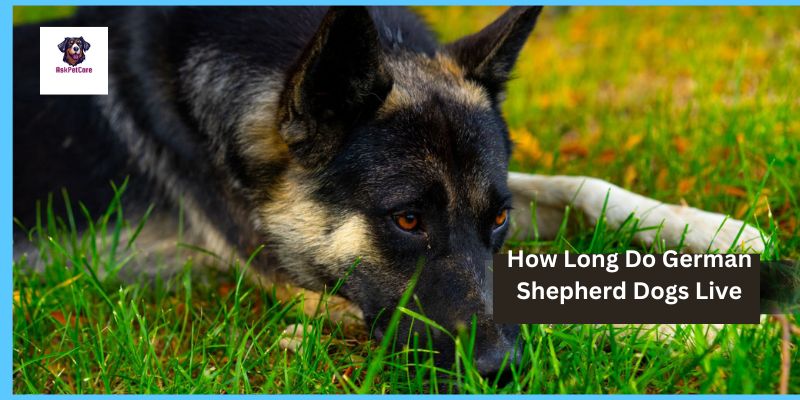
Common Health Issues of German Shepherds:
German Shepherds are prone to certain health conditions, and being aware of these issues can help owners recognize symptoms early, seek appropriate treatment, and take preventive measures to maintain their dog’s health. Here’s a breakdown of some prevalent health concerns in German Shepherds, along with their symptoms, treatment options, and preventive measures:
1. Hip Dysplasia:
- Symptoms: Difficulty rising, reluctance to jump or climb stairs, decreased activity level, limping, and pain in the hip area.
- Treatment Options: Treatment may include pain management, weight management, physical therapy, and surgical interventions such as hip replacement in severe cases.
- Preventive Measures: Responsible breeding practices, maintaining a healthy weight, providing appropriate exercise to strengthen muscles, and avoiding activities that put excessive strain on the hips can help reduce the risk of hip dysplasia.
2. Degenerative Myelopathy:
- Symptoms: Progressive weakness and loss of coordination in the hind limbs, difficulty walking, dragging of the hind feet, and muscle atrophy.
- Treatment Options: Currently, there is no cure for degenerative myelopathy. Treatment focuses on supportive care, such as physical therapy, mobility aids (wheelchairs), and maintaining a comfortable and stimulating environment.
- Preventive Measures: While degenerative myelopathy has a genetic component, maintaining overall health and providing mental and physical stimulation can help delay the onset or progression of symptoms.
3. Bloat (Gastric Dilatation-Volvulus):
- Symptoms: Swollen abdomen, unproductive attempts to vomit, restlessness, excessive salivation, rapid breathing, and weakness.
- Treatment Options: Bloat is a medical emergency that requires immediate veterinary attention. Treatment may involve decompression of the stomach, fluid therapy, and surgery to correct the twisted stomach.
- Preventive Measures: Feed multiple smaller meals throughout the day instead of one large meal, avoid vigorous exercise immediately before or after meals, and consider a gastropexy procedure to reduce the risk of stomach twisting in high-risk dogs.
4. Allergies:
- Symptoms: Itching, scratching, chewing at the skin, redness, inflammation, ear infections, and hair loss.
- Treatment Options: Treatment may involve identifying and avoiding the allergen (if possible), symptomatic relief with medications such as antihistamines or steroids, topical treatments, and allergy testing and immunotherapy in severe cases.
- Preventive Measures: Maintain good skin and coat health through regular grooming, provide a balanced diet with high-quality ingredients, and minimize exposure to potential allergens such as pollen, dust mites, and certain foods.
By staying informed about these common health issues, observing your German Shepherd for any signs or symptoms, and working closely with your veterinarian, you can help ensure early detection, appropriate treatment, and preventive care to promote your dog’s overall health and well-being.

Tips for Extending the Lifespan of German Shepherds:
Extending the lifespan of your German Shepherd involves more than just addressing health issues as they arise. It’s about proactively caring for your dog’s physical, mental, and emotional well-being throughout their life. Here are some tips to help your furry friend live a longer, healthier, and happier life:
1. Proper Diet and Nutrition Recommendations:
- Feed a Balanced Diet: Provide your German Shepherd with high-quality dog food that is appropriate for their age, size, and activity level. Look for foods with real meat as the primary ingredient and avoid fillers and artificial additives.
- Portion Control: Avoid overfeeding and monitor your dog’s weight to prevent obesity, which can lead to various health issues. Follow feeding guidelines provided by your veterinarian based on your dog’s individual needs.
- Hydration: Ensure your dog has access to clean, fresh water at all times to support proper digestion, circulation, and overall health.
2. Exercise Routines Tailored to the Breed’s Needs:
- Daily Exercise: German Shepherds are active dogs that require daily exercise to stay healthy and happy. Provide opportunities for physical activity such as walks, runs, fetch, and interactive play sessions.
- Mental Stimulation: In addition to physical exercise, engage your German Shepherd’s mind with training sessions, puzzle toys, and interactive games. Mental stimulation helps prevent boredom and encourages problem-solving skills.
- Variety: Mix up your dog’s exercise routine to keep them engaged and prevent burnout. Explore different activities such as hiking, agility training, and swimming to provide a well-rounded fitness regimen.
3. Regular Vet Visits and Preventive Care:
- Schedule Routine Check-ups: Regular veterinary check-ups are essential for monitoring your dog’s health, detecting any issues early, and providing preventive care such as vaccinations, parasite control, and dental exams.
- Stay Up-to-Date on Vaccinations: Ensure your German Shepherd receives all necessary vaccinations according to your veterinarian’s recommendations to protect against common canine diseases.
- Parasite Prevention: Use flea, tick, and heartworm preventives as recommended by your vet to protect your dog from parasites that can cause illness and potentially shorten their lifespan.
4. Mental Stimulation and Socialization for Overall Well-being:
- Training and Socialization: Enroll your German Shepherd in obedience classes and socialization activities from a young age to help them develop good manners, confidence, and positive interactions with people and other dogs.
- Engage in Activities Together: Spend quality time with your dog participating in activities they enjoy, such as hiking, agility courses, or even simple games of fetch in the backyard.
- Provide Mental Challenges: Stimulate your dog’s mind with puzzle toys, scent games, and training exercises to keep them mentally sharp and engaged.
By incorporating these tips into your German Shepherd’s daily routine, you can help them lead a fulfilling life filled with health, happiness, and companionship for many years to come. Remember to consult with your veterinarian for personalized recommendations based on your dog’s individual needs and health status.

Quality of Life in Senior German Shepherds Signs of aging and how to adapt care accordingly.
As German Shepherds age, their needs change, and it’s essential to adapt their care to ensure they maintain a high quality of life. Here are some tips for caring for senior German Shepherds:
1. Signs of Aging and How to Adapt Care Accordingly:
- Decreased Energy Levels: Senior German Shepherds may become less active and require more rest. Allow them to rest when needed and avoid overexertion.
- Joint Stiffness and Pain: Arthritis and other joint issues are common in older dogs. Provide soft bedding and consider ramps or steps to help them access elevated surfaces more easily.
- Changes in Appetite: Appetite may decrease in senior dogs due to dental issues or decreased sense of smell. Offer softer foods or moisten dry kibble to make it easier to chew.
- Cognitive Changes: Senior dogs may experience cognitive decline, leading to confusion or disorientation. Keep their environment familiar and provide mental stimulation to keep their minds active.
2. Adjustments in Exercise and Diet for Senior Dogs:
- Low-Impact Exercise: Modify exercise routines to include shorter, gentler walks and activities that are easy on the joints. Swimming or hydrotherapy can be excellent low-impact exercises for senior dogs.
- Weight Management: Monitor your senior German Shepherd’s weight closely and adjust their diet as needed to prevent obesity or excessive weight gain. Choose a senior-specific diet formulated to meet their nutritional needs.
- Joint Supplements: Consider adding joint supplements such as glucosamine and chondroitin to your dog’s diet to support joint health and mobility.
3. Providing Comfort and Support in Their Later Years:
- Comfortable Environment: Create a comfortable living space for your senior German Shepherd with soft bedding, cozy blankets, and easy access to water and food bowls.
- Regular Veterinary Check-ups: Schedule more frequent check-ups with your veterinarian to monitor your dog’s health and address any age-related issues promptly.
- Pain Management: Discuss pain management options with your vet, such as medications or therapies to alleviate discomfort associated with arthritis or other chronic conditions.
- Emotional Support: Provide plenty of love, attention, and reassurance to your senior dog. Be patient and understanding as they may experience anxiety or changes in behavior.
By making adjustments to your senior German Shepherd’s care routine and providing the support they need, you can help them navigate their golden years with comfort, dignity, and quality of life. Remember to cherish the time you have together and celebrate the special bond you share.
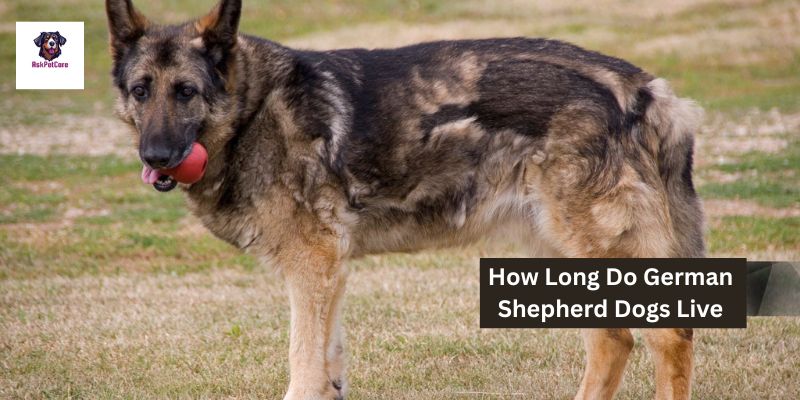
What Do German Shepherds Usually Die From?
German Shepherds, like all dog breeds, can be susceptible to a variety of health issues as they age. While each dog is unique and may face different challenges, there are some common causes of death among German Shepherds. Here are a few:
- Age-related Conditions: As German Shepherds grow older, they may develop age-related health issues such as arthritis, organ failure (like kidney or liver failure), or cognitive decline. These conditions can affect their quality of life and may eventually lead to their passing.
- Cancer: Cancer is unfortunately prevalent in dogs, including German Shepherds. They can develop various types of cancer, such as lymphoma, osteosarcoma (bone cancer), or hemangiosarcoma (a type of blood vessel cancer). Cancer can be aggressive and difficult to treat, leading to a decline in health and ultimately, death.
- Degenerative Diseases: Degenerative diseases like degenerative myelopathy (a progressive spinal cord disease) or degenerative joint disease (arthritis) can impact mobility and quality of life as a German Shepherd age. These conditions may not directly cause death, but they can contribute to a decline in health over time.
- Gastric Dilatation-Volvulus (GDV or Bloat): Bloat is a life-threatening condition that can affect deep-chested breeds like German Shepherds. It occurs when the stomach fills with gas and twists, cutting off blood flow. Bloat requires immediate veterinary attention, and if left untreated, it can be fatal.
- Heart Disease: German Shepherds can be prone to certain heart conditions, such as dilated cardiomyopathy or valve diseases. Heart disease can lead to symptoms like weakness, coughing, and difficulty breathing, and if left untreated, it can ultimately result in heart failure.
- Accidents or Trauma: Accidents or traumatic injuries, such as being hit by a car or sustaining a serious fall, can also lead to the death of a German Shepherd. It’s essential to keep your dog safe and supervise them, especially when outdoors or in unfamiliar environments.
While these are some common causes of death among German Shepherds, it’s important to remember that each dog is unique, and their lifespan and health can be influenced by various factors, including genetics, lifestyle, and quality of care. Regular veterinary check-ups, preventive care, and attentive observation can help detect health issues early and improve the chances of a longer, healthier life for your beloved German shepherd.

How long do German shepherd dogs live female?
On average, female German Shepherds typically live between 9 to 13 years. However, this lifespan can vary depending on various factors such as genetics, diet, exercise, and overall health care.
Genetics: Genetics plays a significant role in determining a German Shepherd’s lifespan. Responsible breeding practices can help reduce the risk of inheriting certain health conditions that may impact longevity.
Diet and Nutrition: Providing a balanced and nutritious diet is essential for a female German Shepherd’s health and longevity. High-quality dog food that meets their nutritional needs can help support their immune system, maintain healthy organs, and prevent obesity-related health issues.
Exercise and Activity: Regular exercise is crucial for female German Shepherds to stay physically and mentally healthy. Daily walks, playtime, and mental stimulation help maintain muscle strength, cardiovascular health, and mental well-being.
Veterinary Care: Routine veterinary check-ups are essential for monitoring a female German Shepherd’s health and detecting any potential issues early. Vaccinations, parasite prevention, dental care, and regular screenings can all contribute to a longer and healthier life.
Spaying: Spaying, or neutering, a female German Shepherd can also impact her lifespan. Spaying at an appropriate age can prevent certain reproductive-related health issues and reduce the risk of certain cancers.
Owners need to be proactive in providing proper care and attention to their female German Shepherds throughout their lives. By addressing their needs for nutrition, exercise, veterinary care, and preventive measures, owners can help ensure that their female German Shepherds live long, healthy, and fulfilling lives as cherished companions.
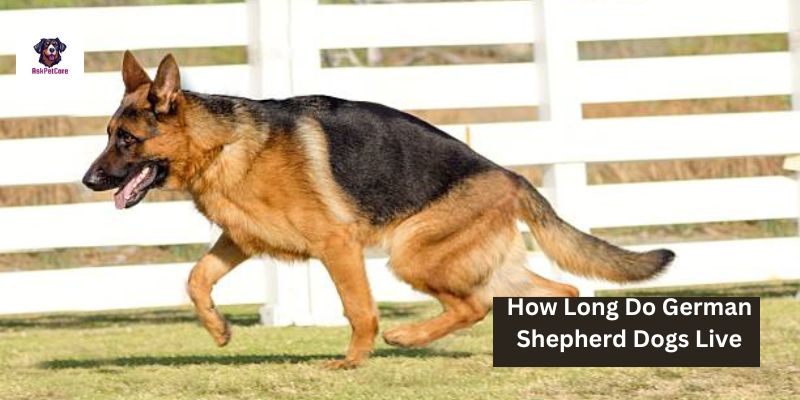
German shepherd end-of-life symptoms.
As German Shepherds age, they may exhibit certain signs that indicate they are approaching the end of their life. While each dog is unique, some common end-of-life symptoms in German Shepherds include:
- Decreased Appetite: A noticeable decrease in appetite or refusal to eat can be a sign that a German Shepherd is nearing the end of their life. This can be due to a variety of factors, including illness, pain, or a natural decline in their body’s functions.
- Lethargy and Weakness: Senior German Shepherds may become increasingly lethargic and weak as they near the end of their life. They may have difficulty moving around or may spend more time sleeping and resting.
- Changes in Breathing: Changes in breathing patterns, such as rapid or labored breathing, can indicate that a German Shepherd is experiencing discomfort or distress. Shallow breathing or gasping for air may also occur as the body’s organs begin to shut down.
- Loss of Coordination: Senior German Shepherds may experience a loss of coordination or balance as their body functions decline. They may have difficulty standing or walking steadily and may stumble or fall more frequently.
- Incontinence: Loss of bladder or bowel control is common in aging German Shepherds, particularly as they approach the end of their life. This can manifest as accidents indoors or difficulty holding their urine or feces.
- Withdrawal and Disinterest: Senior German Shepherds may become increasingly withdrawn or disinterested in their surroundings as they near the end of their lives. They may seek out quiet, secluded areas and may show less interest in activities or interactions with their human companions.
- Pain or Discomfort: Signs of pain or discomfort, such as vocalizing, whimpering, or restlessness, may indicate that a German Shepherd is experiencing discomfort as they approach the end of their life. It’s important to provide comfort and pain relief measures as needed.
It’s essential for owners to monitor their senior German Shepherds closely and provide comfort, support, and veterinary care as needed during this time. Consulting with a veterinarian can help ensure that the dog’s end-of-life needs are met with compassion and dignity.

Longest living German shepherd.
Determining the longest-living German Shepherd can be challenging because the lifespan of individual dogs can vary greatly depending on various factors such as genetics, environment, diet, exercise, and overall health care. However, there have been instances of German Shepherds living notably long lives.
The longest-living German Shepherds are often those who receive exceptional care throughout their lives. This care includes providing a balanced diet tailored to their nutritional needs, regular exercise to maintain physical and mental health, routine veterinary check-ups for early detection and treatment of health issues, and a loving and stimulating environment that promotes overall well-being.
Some key factors that can contribute to a German Shepherd living a longer life include:
- Genetics: Responsible breeding practices can play a significant role in determining a dog’s lifespan. Dogs from reputable breeders who prioritize health and longevity in their breeding programs may have a better chance of living longer.
- Nutrition: Providing a high-quality diet that meets a German Shepherd’s nutritional needs is essential for their overall health and longevity. A balanced diet supports a strong immune system, healthy organs, and proper weight management.
- Exercise: Regular exercise helps maintain a German Shepherd’s physical and mental well-being. Daily walks, playtime, and mental stimulation contribute to their overall health and can help prevent obesity and related health issues.
- Veterinary Care: Routine veterinary check-ups are crucial for monitoring a German Shepherd’s health and detecting any potential issues early. Vaccinations, parasite prevention, dental care, and regular screenings can all contribute to a longer and healthier life.
- Stress Management: Minimizing stress and providing a stable and nurturing environment can contribute to a German Shepherd’s overall well-being. Positive socialization experiences, a comfortable living space, and plenty of love and attention can help reduce stress and promote longevity.
While there is no definitive answer to who the longest-living German Shepherd is, providing exceptional care and attention throughout their life can greatly increase their chances of living a long and fulfilling life as a beloved companion. Each German Shepherd is unique, and by prioritizing their health and well-being, owners can help ensure that they enjoy many happy and healthy years together.
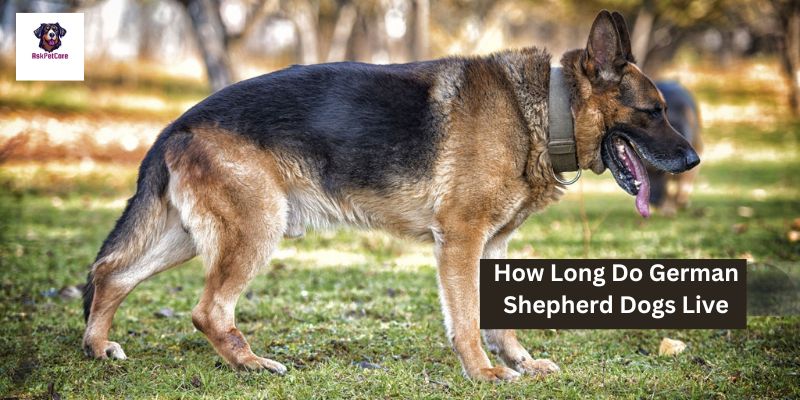
German shepherd age chart:
A German shepherd age chart can help dog owners understand how their pets age in comparison to human years. While there’s no exact conversion, these charts provide approximate age equivalents to give owners an idea of where their dog is in terms of life stages. Here’s a simplified version:
- 0-2 years old: This is the puppy stage, equivalent to a human baby and toddler. German Shepherds are growing rapidly during this time and require lots of attention, training, and socialization.
- 3-5 years old: At this stage, your German Shepherd is equivalent to a young adult human. They’re energetic, active, and full of vitality. This is often considered the prime of their life.
- 6-8 years old: In human years, your German Shepherd is entering middle age. They may start to show signs of slowing down, and you might notice some changes in their health and behavior.
- 9-11 years old: This stage is similar to the human middle to late adulthood. Your German Shepherd may start to experience age-related health issues and may require adjustments to their care and lifestyle.
- 12+ years old: Dogs in this age range are considered seniors. They may need extra support and care, including regular veterinary check-ups, a modified diet, and accommodations to make their environment more comfortable and accessible.
Remember, individual dogs may age differently based on factors such as genetics, environment, and overall health. It’s essential to monitor your German Shepherd closely and adapt their care as needed to ensure they enjoy a happy and healthy life at every stage. Regular veterinary check-ups can also help detect any age-related issues early and provide appropriate treatment and support.
Here’s a simple table outlining the age stages of a German shepherd with short descriptions:
| Age Stage | Description |
| 0-2 years | The puppy stage is equivalent to a human baby and toddler. Rapid growth, lots of energy, and requires training and socialization. |
| 3-5 years | Young adult stage, equivalent to a young adult human. Energetic, active, and in their prime. Requires regular exercise and mental stimulation. |
| 6-8 years | Middle-aged stage, similar to human middle age. Begins to slow down, may show signs of aging, and may require adjustments to care. |
| 9-11 years | Late middle-aged stage, similar to human late adulthood. May experience age-related health issues and need extra support and care. |
| 12+ years | Senior stage, equivalent to human seniors. Requires special attention, regular veterinary check-ups, and adjustments to diet and lifestyle for comfort and well-being. |
This table provides a simple overview of the different life stages of a German Shepherd and what owners can expect during each stage.

German Shepherd Lifespan – Male
German Shepherds are wonderful companions known for their loyalty, intelligence, and versatility. Like all dogs, the lifespan of a male German Shepherd can vary depending on various factors such as genetics, diet, exercise, and overall health care.
Puppy Stage (0-2 years):
- This stage is like the baby and toddler stage in humans.
- Male German Shepherd puppies grow rapidly, full of energy, and require lots of attention, training, and socialization.
- During this time, they are playful, curious, and eager to learn about the world around them.
Young Adult Stage (3-5 years):
- This stage is equivalent to young adulthood in humans.
- Male German Shepherds are at their prime during this time, full of energy, and eager to explore and play.
- Regular exercise, mental stimulation, and training are essential to maintain their physical and mental well-being.
Middle-Aged Stage (6-8 years):
- Similar to human middle age, male German Shepherds begin to slow down during this stage.
- They may show signs of aging, such as decreased energy levels, stiffness, or changes in behavior.
- Adjustments to their care may be necessary to accommodate their changing needs.
Late Middle-Aged Stage (9-11 years):
- Male German Shepherds in this stage are similar to humans in late adulthood.
- They may start to experience age-related health issues, such as arthritis, vision or hearing loss, or dental problems.
- Extra support and care, including regular veterinary check-ups and adjustments to their diet and lifestyle, may be necessary.
Senior Stage (12+ years):
- At this stage, male German Shepherds are considered seniors, equivalent to human seniors.
- They may require special attention and care, including regular veterinary check-ups, a modified diet, and accommodations to make their environment more comfortable and accessible.
- Providing love, comfort, and support during their senior years is essential to ensure they enjoy a happy and fulfilling life to the fullest extent possible.
By understanding the different life stages of male German Shepherds and providing them with the care and attention they need at each stage, owners can help ensure that their beloved companions live long, healthy, and happy lives.
100 lb. German Shepherd Lifespan:
A 100 lb German Shepherd is a large and robust dog, and their lifespan can be influenced by various factors, including genetics, diet, exercise, and overall health care.
Genetics:
- Genetics play a significant role in determining the lifespan of a German Shepherd, regardless of their size. Dogs from healthy bloodlines with responsible breeding practices tend to have longer lifespans.
Diet and Nutrition:
- Providing a balanced and nutritious diet is crucial for the health and longevity of a 100 lb German Shepherd. High-quality dog food that meets their nutritional needs supports their immune system, maintains healthy organs, and prevents obesity-related health issues.
Exercise and Activity:
- Regular exercise is essential for maintaining the physical and mental well-being of a 100 lb German Shepherd. Daily walks, playtime, and mental stimulation help prevent obesity, strengthen muscles, and keep them mentally sharp.
Veterinary Care:
- Routine veterinary check-ups are essential for monitoring the health of a 100 lb German Shepherd and detecting any potential issues early. Vaccinations, parasite prevention, dental care, and regular screenings can all contribute to a longer and healthier life.
Common Health Issues:
- Large breed dogs like 100 lb German Shepherds may be prone to certain health issues, including hip dysplasia, elbow dysplasia, bloat, and arthritis. Managing these conditions through proper care and treatment can help extend their lifespan.
Quality of Life:
- Providing a loving and nurturing environment is essential for the overall well-being of a 100 lb German Shepherd. Mental stimulation, socialization, and plenty of love and attention contribute to their happiness and longevity.
By understanding the needs of a 100 lb German Shepherd and providing them with proper care, attention, and love throughout their life, owners can help ensure that their beloved companion enjoys a long, healthy, and fulfilling life. Regular veterinary check-ups, a balanced diet, regular exercise, and lots of love and affection are key ingredients for a happy and healthy life for a 100 lb German Shepherd.
Average Lifespan of a German Shepherd Mix:
A German Shepherd mix, like any other dog, can have a varied lifespan influenced by several factors, including genetics, size, diet, exercise, and overall health care.
Genetics:
- The lifespan of a German Shepherd mix can be influenced by the genes inherited from both parent breeds. Mix breeds often inherit a combination of traits from both breeds, including their health predispositions.
Size:
- The size of a German Shepherd mix can vary depending on the other breed(s) in the mix. Smaller breeds mixed with a German Shepherd may have different lifespans compared to larger breeds mixed with a German Shepherd.
Diet and Nutrition:
- Providing a balanced and nutritious diet is essential for the health and longevity of a German Shepherd mix. High-quality dog food that meets their nutritional needs supports their overall health and helps prevent obesity-related health issues.
Exercise and Activity:
- Regular exercise is crucial for maintaining the physical and mental well-being of a German Shepherd mix. Daily walks, playtime, and mental stimulation help prevent obesity, strengthen muscles, and keep them mentally stimulated.
Veterinary Care:
- Routine veterinary check-ups are important for monitoring the health of a German Shepherd mix and detecting any potential issues early. Vaccinations, parasite prevention, dental care, and regular screenings contribute to their overall health and longevity.
Common Health Issues:
- German Shepherds and their mixes can be prone to certain health issues, including hip dysplasia, elbow dysplasia, bloat, and arthritis. Being aware of these potential health concerns and addressing them promptly can help extend their lifespan.
Quality of Life:
- Providing a loving and nurturing environment is essential for the overall well-being of a German Shepherd mix. Mental stimulation, socialization, and plenty of love and attention contribute to their happiness and longevity.
While there’s no definitive answer to the average lifespan of a German Shepherd mix, providing proper care, attention, and love throughout their life can help ensure that they enjoy a long, healthy, and fulfilling life. Each dog is unique, and by understanding their individual needs and providing them with the best possible care, owners can help maximize their companion’s lifespan and quality of life.
- How long do indoor German Shepherds live?
Indoor German Shepherds, like their outdoor counterparts, typically live between 9 to 13 years. However, indoor living conditions, proper care, and regular veterinary check-ups can contribute to their overall health and potentially extend their lifespan.
- Is 10 old for a German Shepherd?
Yes, 10 years old is considered old for a German Shepherd. While some German Shepherds may live beyond 10 years, reaching this age indicates that they have entered their senior years. At this stage, they may require extra attention to their health and well-being.
- What is the maximum age of a German Shepherd?
The maximum age of a German Shepherd can vary, but typically, they live between 9 to 13 years. Some may live beyond this range, with exceptional care and genetics contributing to their longevity. However, it’s essential to note that individual dogs may have different lifespans based on various factors.
- Which dog lives the longest?
The dog breed that holds the record for the longest lifespan is the Chihuahua, with some individuals living up to 20 years or more. However, mixed-breed dogs often have longer lifespans compared to purebred dogs, as they may inherit a broader gene pool, potentially reducing the risk of certain genetic health issues.
I hope you will thoroughly understand how long do German shepherds live, and which factors affect on long life. Still, any quarry contacts me.
Here are some reference books that are considered authoritative on the topic of dog care, including nail care:
- “The Complete Dog Owner’s Manual” by Dr. Bruce Fogle
- “The Ultimate Guide to Dog Care: Everything You Need to Know to Keep Your Dog Happy and Healthy” by Amy Marder and Andrew Luescher
